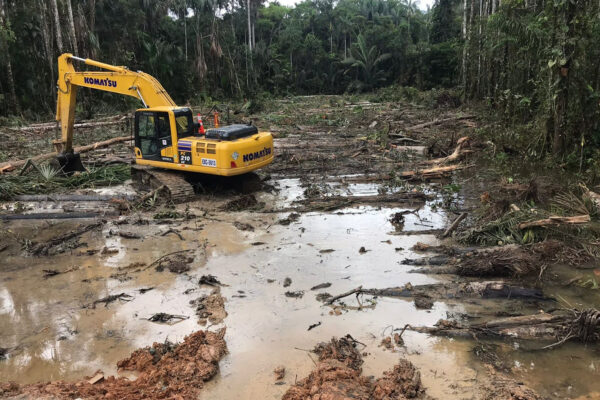Lima, Peru (May 28th 2009) – Mass peaceful demonstrations against Peru’s Garcia Administration’s ‘free trade laws’ entered their 50th day today and continued to paralyze transportation routes and oil production in the Amazon region. Since Tuesday of this week, an estimated 2,500 Wambis and Awajun indigenous people have blockaded a 20-kilometer stretch of the main road to the northern Amazon. In Southern Peru, some 350 indigenous Matsigenka have set up a blockade in the town of Machu Picchu, disrupting service to the country’s top tourist destination.
In Lima this week, the constitutional committee of Peruvian Congress shot down another of the controversial free trade laws as unconstitutional. Meanwhile, a long awaited joint commission of the government began its first day of official talks with indigenous leaders with an aim of addressing the government’s problematic policies towards indigenous peoples of the Amazon.
Although high-level dialogue has begun, tensions still run high throughout the country. Indigenous peoples say they will continue protesting until the government repeals the laws that undermine their rights. In the Andes and Amazon regions, thousands more have joined the protests. In the northern Amazonas region, 2,500 protesters constructed dozens of blockades between kilometers 180 and 199 of the Fernando Belaunde Terry Road which connects the states of Amazonas and San Martín to the rest of Peru. In Cusco indigenous Matsigenka carrying bows and arrows forced Perurail to suspend train services to Machu Picchu. The road between the major northern towns of Yurimaguas and Tarapoto remains closed after 15 days of blockades. Hundreds of people joined solidarity marches in Lima while thousands of people closed towns, roads and bridges in Chiclayo, Cajamarca and Iquitos. EFE reports that clashes on Wednesday in Iquitos resulted in eleven wounded and twenty detained. The State of Emergency, declared on May 9th, is still in effect and legal charges against AIDESEP leaders are still pending.
The state oil company, Petroperu, confirmed that the 40,000 barrels-per-day northern Peru pipeline has been closed since May 20 due to protests around pumping stations 5 and 6. The Argentinean company Pluspetrol has been forced to halt production in block 1-AB, which normally produces 16,000 b/d. Petroperu also announced the possible shutdown of the 10,000 b/d refinery in Iquitos.
In Lima, the constitutional committee of Congress ruled that legislative decree 994 was unconstitutional. Decree 994 is part of a packet of 99 laws issued by President Garcia under special powers granted by Congress in the context of the Free Trade Agreement with the United States. Last week the committee also ruled that decree 1090 is also unconstitutional. The constitutional committee found that according to the Constitution legislation regarding land use and forest resources could only be created by the full congress and not just the president. Indigenous people say that Peru is in contravention of international indigenous rights conventions because they were never consulted about the new laws that directly affect them. The commission is scheduled to rule on eight additional laws in the coming weeks.
On Wednesday the government finally began official talks with seven indigenous representatives from across the Amazon. For nearly two months, the government has been aggressively attempting to quell indigenous protests through intimidation tactics and force including deploying the armed forces, declaring a state of emergency and bringing criminal charges against indigenous leaders. But in an about face on Tuesday of this week, following meetings with AIDESEP on Prime Minister Yehude Simon said, “What is interesting is that what indigenous leaders are asking for seems to me to be perfectly justified, such as bilingual education and health”. In a joint statement with indigenous leader Alberto Pizango, Simon acknowledged that “there has been a total lack of communication between the government and indigenous communities … they have been ignored and forgotten for 200 years.” He declared that the executive branch of the government had agreed to review each of the laws in question, and committed that they would “kill” any articles that adversely affect indigenous peoples. “This work must continue through the coming years and transcend other government priorities,” he asserted.
The official talks will include discussion of the four main demands of the indigenous peoples:
1. Recognition and protection of indigenous territories including ancestral lands.
2. Recognition of the self-determination of indigenous peoples and fulfillment of the government’s obligations to respect indigenous rights according to Convention 169 of the International Labor Organization and the UN Declaration of Indigenous Peoples Rights.
3. The provision of health care services and bilingual education for indigenous communities.
4. Economic development with identity considering alternatives such as medicinal plants or local crafts that can bring development to the Amazon without damaging the environment or threatening the cultural survival of the region’s indigenous peoples.
The protests have provoked national debate about government policies in the Amazon that ignore indigenous peoples and encourages large-scale extractive industries and the privatization of Amazonian lands. Indigenous peoples claim that new laws passed in the context of the Free Trade Agreement with the United States undermine their rights and open up their ancestral lands to private companies for mining, logging, plantations and oil drilling. In a statement, the Secoya and Kichwa people, who continue to blockade the Napo river, said: “We want development without losing our identity, without destroying the environment, and without entering into conflict with other people.” Regional indigenous leaders have stated that the protests will continue until there are actual changes to the laws.
# # #
Further Information:
Legislative Decree 994 promotes private investment in irrigation projects and considers all “tierras eriazas” with agricultural potential that are not registered in the Public Registrar as state property. “Tierras eriazas” are defined as “land with agricultural potential that is not in use due to a lack or an excess of water, or otherwise unproductive land”. A report by a special congressional committee tasked with investigating the impacts of these laws on indigenous peoples concluded “in the case of the Amazon, land considered eriaza due to excess water serves as the source of subsistence for communities, as is the case with flood-forest, or river banks where they collect turtle eggs, that is to say they are not being exploited industrially, but they provide the daily alimentation for indigenous populations in the jungle.”
Many indigenous communities throughout the Amazon do not hold an official title to their lands and the areas they rely on for subsistence. The report states that 994 violates article 17 of ILO convention 169 since it reduces the State’s protection of community land.
Legislative Decree 1090 modifies 38 articles of the 2000 Forest and Fauna Law. It initially caused outcry amongst civil society groups and was modified by law 29317 in January 2009. Civil society groups say the biggest problem with the modified law is a clause in article 6 that allows forest-land to be reclassified as agricultural land and sold to a private company if it is considered “in the national interest”. In legislation last year the government declared biofuel monocrops as being in the national interest. Experts also complain that the new law reduces civil society participation and transparency in the forestry sector. According to Hugo Che Piu, director of Derecho, Ambiente y Recursos naturales, the new law reflects a major change in policy, shifting from a system of fixed-term concessions being granted to logging companies to giving companies property rights to large tracts of the Amazon.













